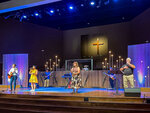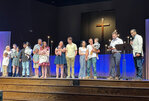

DOUGLASVILLE, Ga. — Beulah Church/Iglesia Beulah introduces new members at its quarterly church business meetings, and seven families came forward at the last one. Of the seven families that joined at that meeting, five were Hispanic.
Pastor Steven Greene attributes that, in part, to the changing demographics in Douglasville, on the west side of metro Atlanta. But, he adds, the church has also become very intentional in its outreach to the Hispanic community.
Beulah Church first started a Hispanic ministry 9 years ago.
The Spanish ministry, while distinct, Greene specifies, is a part of Beulah Church and not its own church. We have, Greene says, “one church in two languages, not two separate churches.”
The addition of Hispanic minister Josias Ortiz has helped grow the ministry, Greene says.
Additionally, the church began encouraging Hispanic families that had been attending for years to become members. Through education, and with patience, the Hispanic worshippers were taught what church membership means and what the next steps are.
Of the five families that recently joined, four are new to the church and one began attending last year. The man had gone through the entire membership class but had never completed the steps to actually join the church. “He thought he was already a member,” Greene says.
Last year, Greene pitched the idea to his team to hold bilingual English-Spanish services every fifth Sunday.
During these services, the worship team leads the church in song in both languages. Even as the church lifts its voice in one language, the lyrics are displayed in both languages so that worshippers can follow along.
One key aspect of the bilingual services is that live translation is available. Rather than having an interpreter on-stage, the church provides the message in Spanish through a Zoom call. Hispanic worshippers can simply call in on their phones to hear the sermon in their own language, in real time. Using Zoom, Greene says, means they church did not have to invest in additional, expensive equipment, and makes the translation easily accessible. “Everyone has a phone,” he says.
Since the church began making the translation available, Hispanic attendance has increased. “More people are coming,” Greene notes, “now that they know they can get a quality translation.” Hispanic attendance hit an all-time high at Beulah on Sunday, Sept. 8, with 78 people coming to Iglesia Beulah. Average attendance, according to Greene, is in the low 50s.
Greene hopes to encourage other churches that are facing similar issues and demographic changes to become intentional in reaching out to the Hispanic community. “We have grown,” he says, “from not really investing a whole lot to investing a whole salary.”
The results so far are exciting for Greene, who says, “One of the most fruitful, spiritual consequences is that we are seeing a higher number of salvations and baptisms among our Hispanic community.” More new Hispanic members, he explains, are converts rather than transfers from other churches.
“There is so much opportunity,” Greene concludes, “the harvest is ready.”